| Listing 1 - 10 of 22 | << page >> |
Sort by
|
Book
Abstract | Keywords | Export | Availability | Bookmark
 Loading...
Loading...Choose an application
- Reference Manager
- EndNote
- RefWorks (Direct export to RefWorks)
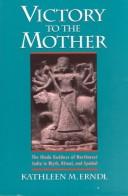
ISBN: 0195070151 9780195070156 Year: 1993 Publisher: New York (N.Y.) : Oxford university press,
Abstract | Keywords | Export | Availability | Bookmark
 Loading...
Loading...Choose an application
- Reference Manager
- EndNote
- RefWorks (Direct export to RefWorks)
Book
Year: 1991 Publisher: Delhi Agam Kala Prakashan
Abstract | Keywords | Export | Availability | Bookmark
 Loading...
Loading...Choose an application
- Reference Manager
- EndNote
- RefWorks (Direct export to RefWorks)
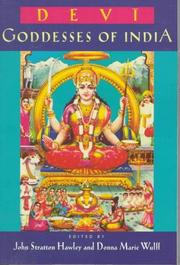
ISBN: 0520916298 0585105960 9780520916296 9780585105963 0520200578 0520200586 9780520200579 9780520200586 Year: 1996 Publisher: Berkeley University of California Press
Abstract | Keywords | Export | Availability | Bookmark
 Loading...
Loading...Choose an application
- Reference Manager
- EndNote
- RefWorks (Direct export to RefWorks)
The monotheistic religions of Judaism, Christianity, and Islam have severely limited the portrayal of the divine as feminine. But in Hinduism "God" very often means "Goddess." This extraordinary collection explores twelve different Hindu goddesses, all of whom are in some way related to Devi, the Great Goddess. They range from the liquid goddess-energy of the River Ganges to the possessing, entrancing heat of Bhagavati and Seranvali. They are local, like Vindhyavasini, and global, like Kali; ancient, like Saranyu, and modern, like "Mother India." The collection combines analysis of texts with intensive fieldwork, allowing the reader to see how goddesses are worshiped in everyday life. In these compelling essays, the divine feminine in Hinduism is revealed as never before--fascinating, contradictory, powerful.
Book
ISBN: 9780913215012 0913215015 Year: 1985 Publisher: Riverdale, Md.: Riverdale Co.,
Abstract | Keywords | Export | Availability | Bookmark
 Loading...
Loading...Choose an application
- Reference Manager
- EndNote
- RefWorks (Direct export to RefWorks)
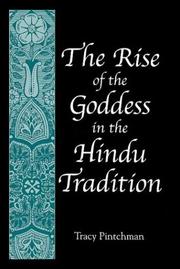
ISBN: 1438416180 058506265X 9780585062655 0791421112 0791421120 9780791421116 9780791421123 Year: 1994 Publisher: Albany, N.Y. State University of New York Press
Abstract | Keywords | Export | Availability | Bookmark
 Loading...
Loading...Choose an application
- Reference Manager
- EndNote
- RefWorks (Direct export to RefWorks)
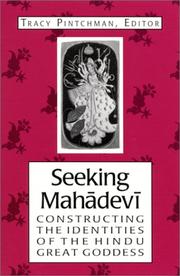
ISBN: 0791450082 0791450074 9780791450079 9780791450086 0791490491 9780791490495 Year: 2001 Publisher: Albany: State university of New York press,
Abstract | Keywords | Export | Availability | Bookmark
 Loading...
Loading...Choose an application
- Reference Manager
- EndNote
- RefWorks (Direct export to RefWorks)
While Hindus recognize and revere a variety of different goddesses, they also tend to speak of one Great Goddess, Mahadevi, as a singular divine being who is the unity underlying all female deities. In this book, ten scholars reflect on both the diverse depictions of Mahadevi found in textual and devotional environments and the ways that the singularity and multiplicity of the divine Hindu feminine are negotiated. Seeking Mahadevicovers various geographical locations, from the Punjab and Bengal in North India to Kerala and Tamilnadu in the South, and makes use of evidence from ancient texts and contemporary interviews, male-authored documents and women's possession experiences, myth, ritual, and folklore. Arguing that Mahadevi has multiple, context-dependent identities that are constructed through human interpretive activity, this book highlights the great diversity of ways that those who worship Mahadevi conceive of and portray her.Contributors include C. Mackenzie Brown, Sarah Caldwell, Thomas Coburn, Elaine Craddock, Kathleen M. Erndl, Jeffrey J. Kripal, Usha Menon, Tracy Pintchman, Andhra Pradesh, and Mark Edwin Rohe.
Goddesses, Hindu. --- Hindu goddesses. --- Hindu goddesses --- Hinduism --- Religion --- Philosophy & Religion --- Goddesses, Hindu --- Goddesses

ISBN: 0520200578 0520200586 9780520200579 9780520200586 Year: 1996 Volume: 7 Publisher: Berkeley (Calif.): University of California press,
Abstract | Keywords | Export | Availability | Bookmark
 Loading...
Loading...Choose an application
- Reference Manager
- EndNote
- RefWorks (Direct export to RefWorks)
The monotheistic religions of Judaism, Christianity, and Islam have severely limited the portrayal of the divine as feminine. But in Hinduism "God" very often means "Goddess." This extraordinary collection explores twelve different Hindu goddesses, all of whom are in some way related to Devi, the Great Goddess. They range from the liquid goddess-energy of the River Ganges to the possessing, entrancing heat of Bhagavati and Seranvali. They are local, like Vindhyavasini, and global, like Kaliancient, like Saranyu, and modern, like "Mother India." The collection combines analysis of texts with intensive fieldwork, allowing the reader to see how goddesses are worshiped in everyday life. In these compelling essays, the divine feminine in Hinduism is revealed as never before--fascinating, contradictory, powerful.
Goddesses, Hindu. --- Hindu goddesses. --- Déesses hindoues --- Goddesses [Hindu ] --- Godinnen [Hindoe] --- Déesses hindoues
Book
ISBN: 2855397545 9782855397542 Year: 1989 Volume: 154 Publisher: Paris: École française d'Extrême-Orient,
Abstract | Keywords | Export | Availability | Bookmark
 Loading...
Loading...Choose an application
- Reference Manager
- EndNote
- RefWorks (Direct export to RefWorks)
Hinduism --- Goddesses, Hindu. --- Columns --- Rituals. --- Hinduism - Rituals. --- Columns - India.
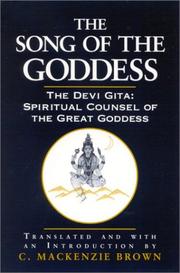
ISBN: 0791488519 0585483256 9780585483252 0791453936 9780791453933 0791453944 9780791453940 9780791488515 Year: 2002 Publisher: Albany State University of New York Press
Abstract | Keywords | Export | Availability | Bookmark
 Loading...
Loading...Choose an application
- Reference Manager
- EndNote
- RefWorks (Direct export to RefWorks)
The Devi Gita, literally the "Song of the Goddess," is an Eastern spiritual classic that appeared around the fifteenth century C.E. C. Mackenzie Brown provides a reader-friendly English translation of this sacred text taken from his well-regarded previous book The Devi Gita: The Song of the Goddess, A Translation, Annotation, and Commentary. Here the translation is presented uninterrupted, without the scholarly annotations of the original version, and in its entirety for the pleasure of all readers who wish to encounter this treasure from the world's sacred literature.Often neglected, the Devi Gita deserves to be better known for its presentations of one of the great Hindu visions of the divine conceived in feminine terms. The work depicts the universe as created, pervaded, and protected by a supremely powerful, all-knowing, and wholly compassionate divine female. It also describes the various spiritual paths leading to realization of unity with the Goddess. The author of the Devi Gita intended for the work to supplant the famous teachings of Krishna in the Bhagavad Gita (the "Song of the Lord") from a goddess-inspired perspective.
Hindu goddesses. --- Hinduism. --- Religions --- Brahmanism --- Goddesses, Hindu --- Goddesses
| Listing 1 - 10 of 22 | << page >> |
Sort by
|

 Search
Search Feedback
Feedback About UniCat
About UniCat  Help
Help News
News